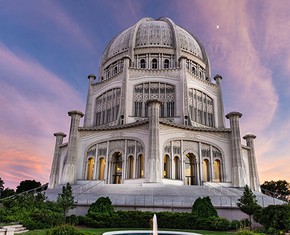The views expressed in our content reflect individual perspectives and do not represent the authoritative views of the Baha'i Faith.
The Baha’i teachings link justice with love: “… the God of love is also a God of justice and each man must inevitably reap what he sows.” – Abdu’l-Baha, Paris Talks, p. 109.
True religion, Baha’is believe, should provide us with both love and justice:
Religion must be the cause of love. Religion must be the cause of justice, for the wisdom of the Manifestations of God is directed toward the establishing of the bond of a love which is indissoluble. – Abdu’l-Baha, The Promulgation of Universal Peace, p. 343.
The law of justice and the law of love constitute an expression of the ultimate goal of the Baha’i Faith—and of every Faith. Baha’is believe that humanity will, through the operation of the law of love in this age of its long-awaited maturity, strive until it attains what has been hailed in the Baha’i writings as “the Most Great Justice.” This condition can be no less than a very high-level expression of spiritual principles and qualities by communities, institutions and individuals, the three major protagonists in society-building processes.
Generally, institutions exercise power and authority to protect the society and its individuals. The Baha’i vision of a mature human society, though, is one in which force is made the servant of justice, and the individuals in that society develop:
… a wholehearted embrace of Baha’u’llah’s teaching that the time has come when each human being on earth must learn to accept responsibility for the welfare of the entire human family. – The Universal House of Justice, 24 May 2001, p. 1.
That primary Baha’i teaching is grounded in the awareness that the unifying forces of life now impel humanity to establish justice and love as the answers to humanity’s most crying need:
The whole earth is now in a state of pregnancy. The day is approaching when it will have yielded its noblest fruits, when from it will have sprung forth the loftiest trees, the most enchanting blossoms, the most heavenly blessings. The time is approaching when every created thing will have cast its burden. Glorified be God Who hath vouchsafed this grace that encompasseth all things, whether seen or unseen! These great oppressions are preparing it for the advent of the Most Great Justice. – Baha’u’llah, quoted by Shoghi Effendi in The Promised Day Is Come, p. 5.
As we consider what that “most great justice” might look like, we can reflect on the implications of the entire Baha’i revelation, summarized here by the Guardian of the Baha’i Faith:
For Baha’u’llah, we should readily recognize, has not only imbued mankind with a new and regenerating Spirit. He has not merely enunciated certain universal principles, or propounded a particular philosophy, however potent, sound and universal these may be. In addition to these He, as well as Abdu’l-Baha after Him, has, unlike the Dispensations of the past, clearly and specifically laid down a set of Laws, established definite institutions, and provided for the essentials of a Divine Economy. These are destined to be a pattern for future society, a supreme instrument for the establishment of the Most Great Peace, and the one agency for the unification of the world, and the proclamation of the reign of righteousness and justice upon the earth. – Shoghi Effendi, The World Order of Baha’u’llah, p. 19.
Since the Baha’i revelation began, the Faith has spread around the world. It is now the second most widespread major Faith on Earth. Baha’is come from every tribe, region, ethnicity, cultural background and society, constituting what one observer called “the most diverse organized body of people on the planet.” Baha’is have no clergy or appointed leaders—instead, every Baha’i leadership body, from the local level to the global, is democratically elected. Baha’is see oneness and unity rather than division and conflict. Baha’is work for peace and harmony among all humanity. Ultimately, Baha’is want to establish a global civilization based on justice and love.
In the next essay in this series, we’ll explore how Baha’is build institutions based on those lofty principles.
















Comments
Sign in or create an account
Continue with Googleor